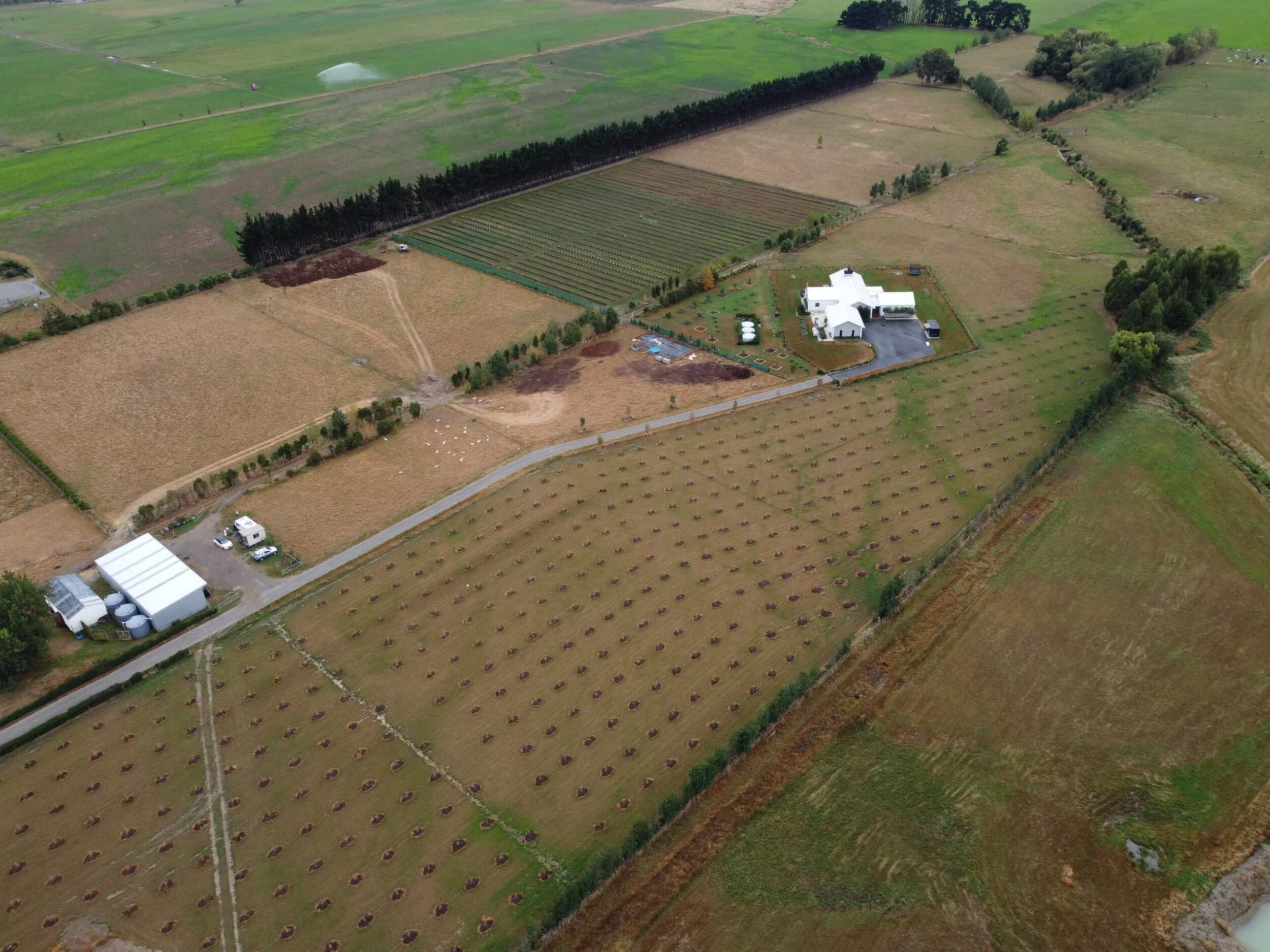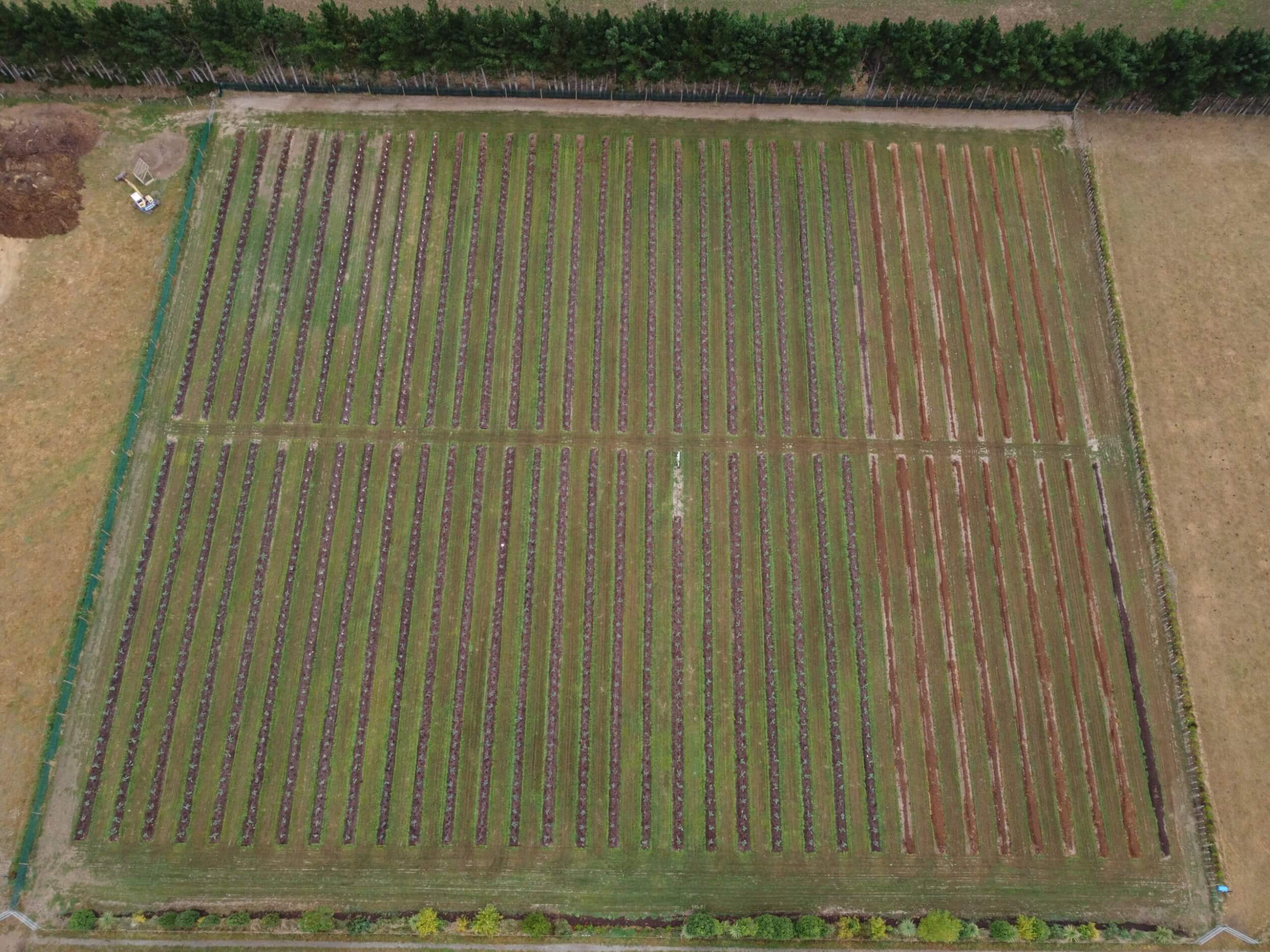Back
BUSINESS > CONFERENCE & BUSINESS EVENTS >

Perched just a few minutes from the well-loved Ginger Bird Café, their 19-hectare farm has recently undergone a quiet but radical transformation. For the last decade, the Bradburys ran heifers, buying in calves and finishing them for the works. It was a familiar rhythm, but not one that lit them up, nor was it particularly profitable on a small block.
“We’ve talked for years about what else we could do,” says Jules. “We’re both quite entrepreneurial by nature, and we always knew we’d want something different down the track.”
With two young kids in tow, remote corporate working, and a growing desire to build something more future facing, the pair began exploring land diversification options that would work for their lifestyle and for the changing climate. The result? Over 2,300 blueberry bushes now stretch across 1.6 hectares of their property, with 500 more on the way. A grove of olive trees has been planted too, with 700 trees going in before the end of 2024.
A pick-your-own dream
Blueberries were the first spark.
“They’re just such a good berry,” says Stu. “They’re not spiky like raspberries, they don’t get as many pests or diseases, and we already knew they could grow well around here.”
What started as a thought soon turned into serious soil tests, consultations with a Tauranga-based blueberry expert, and late nights poring over irrigation plans. With the help of their knowledgeable local Farmlands rep and plenty of DIY grit, they prepared the land - ploughing, planting biofumigant cover crops, and amending the pH to suit blueberry needs.
The final push came when their chosen nursery offered a limited-time special. “We planned to prepare for the plants over the year ready to plant them in 2025,” says Jules. “Suddenly, we got a bargain from the grower, and it was go-time. We rallied friends and family, and planted all 2,300 bushes in a day and a half.”
A second phase of planting is already planned for 2025 and while commercial picking is still at least one season away, the long-term vision is clear: a family-friendly pick-your-own experience, complete with real fruit ice cream and maybe even a playground.
“We love the idea of creating a little hub,” says Jules. “You could stop at Ginger Bird for lunch, pick your blueberries, maybe buy some local extra virgin olive oil - it’s about making something that brings people in and makes them want to stay a while.”





Going big with the addition of olives
If blueberries were a pragmatic choice, olives were a passion project.
“We’ve got some olive plants around the house already that absolutely thrive,” says Jules. “They’re stunning trees, and I just thought – why not diversify even further?”
A few cold calls and a lot of curiosity led Stu and Jules to Gaylene and Hamilton at Rata Olives. A hands-on tour of their grove and pressing operation sealed the deal. “They were amazing,” says Jules. “They’ve been generous with their time and insights, and having a local press just down the road made it all feel do-able.”
The Bradburys now have 700 trees planted on 2.5 hectares of land, with irrigation systems installed and hopes for a small-batch Extra Virgin Olive Oil label in the next 7–10 years. “It’s a long game,” Stu admits. “But it aligns with where the world is heading. With climate change and crop issues in Europe, there’s going to be more demand for high-quality, locally made oil.”
The balancing act of life, work and long-term vision
With Stu working part-time for international irrigation company Lindsay Corp, and Jules running a full accounting practice from her home container office, time is their most precious resource. But that hasn’t stopped them from going all in.
“This isn’t just about making money - it’s about creating something sustainable that works for us,” says Jules.
Stu, who recently started a horticulture certificate through the Open Polytechnic is always looking to learn and create.
“Stu needs balance,” says Jules. “He’s not the kind of guy who’s going to go get a job in town. This gives us purpose, flexibility, and hopefully something we can hand down to the kids one day if they want it.”
Creating an Agri-Tourism hub for Colyton
Stu and Jules are deeply aware of how their venture fits into the wider Colyton and Manawatū community. They envision creating summer jobs for local teens, drawing more visitors into the area, and connecting with other small producers – like Colyton locals Matt and Jana Hocken who have a walnut pick your own agritourism experience to complement their farm tours and farm stay offerings.
“There’s real potential here,” says Jules. “And with the nearby scenic touring routes, and cycleway upgrades on the horizon, this whole area could become a little day-trip destination.”
The Bradburys are also thinking about added-value products. But for now, it’s all about getting the plants established, infrastructure in place, and systems humming.
Advice for other landowners in Manawatū
If there’s one thing Jules and Stu have taken from this experience so far, it’s the power of community.
“Just pick up the phone,” says Stu. “Talk to people. Everyone we’ve contacted, whether it’s other growers, suppliers, or advisors have been open and helpful.”
“Don’t try to do it all alone,” adds Jules. “Join the grower groups, attend their field trips, ask the dumb questions. There’s so much knowledge out there if you’re willing to listen.”
Their other piece of advice? Be bold, but back yourself with a plan and a secure income stream.
“We wouldn’t have done this without our other jobs,” Jules says. “There’s a lot of upfront cost, and it takes time to see a return. But if you’re smart about it, and if it fits your lifestyle, it’s such a rewarding path.”
What’s next for the Bradburys?
They’re taking it one season at a time but the groundwork they’ve laid today hints at something much bigger tomorrow. And come 2027, when the first blueberries are ripe for picking, there’s no doubt that locals will be lining up for a taste, not just of the fruit, but of the Bradburys’ vision for a richer, more resilient future on the land.

CEDA
Level 1, 5 Broadway Avenue,
Palmerston North 4410
+64 6 350 1830
[email protected]
CEDA.nz
Palmerston North City i-SITE
The Square, Palmerston North
0800 MANAWATU
(626 292)
[email protected]
ManawatuNZ.co.nz/isite

Feilding and District
Information Centre
Te Āhura Mōwai
64 Stafford Street
+64 6 323 3318
[email protected]
ManawatuNZ.co.nz/feilding
Tap on the  throughout our website to add an experience, accommodation, or event to ‘My Trip’, or explore directly from our interactive map. View Map >
throughout our website to add an experience, accommodation, or event to ‘My Trip’, or explore directly from our interactive map. View Map >
You can drag and drop activities to reorder them. Try downloading so you can print or share your upcoming Manawatū itinerary